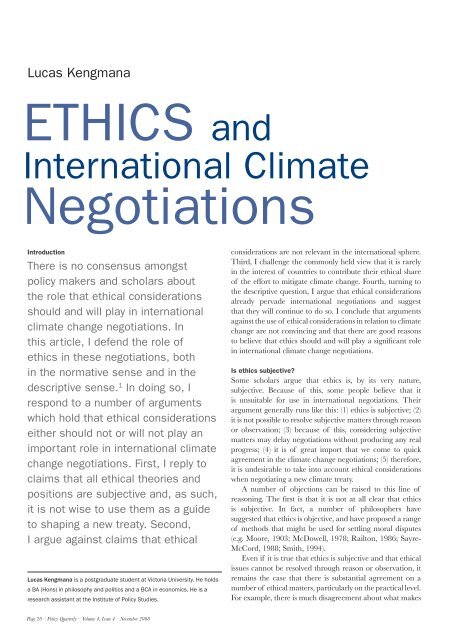Sharing the Burden of Climate Change Policy Quarterly issue with ...
Sharing the Burden of Climate Change Policy Quarterly issue with ...
Sharing the Burden of Climate Change Policy Quarterly issue with ...
Create successful ePaper yourself
Turn your PDF publications into a flip-book with our unique Google optimized e-Paper software.
Lucas Kengmana<br />
Ethics and<br />
International <strong>Climate</strong><br />
Negotiations<br />
Introduction<br />
There is no consensus amongst<br />
policy makers and scholars about<br />
<strong>the</strong> role that ethical considerations<br />
should and will play in international<br />
climate change negotiations. In<br />
this article, I defend <strong>the</strong> role <strong>of</strong><br />
ethics in <strong>the</strong>se negotiations, both<br />
in <strong>the</strong> normative sense and in <strong>the</strong><br />
descriptive sense. 1 In doing so, I<br />
respond to a number <strong>of</strong> arguments<br />
which hold that ethical considerations<br />
ei<strong>the</strong>r should not or will not play an<br />
important role in international climate<br />
change negotiations. First, I reply to<br />
claims that all ethical <strong>the</strong>ories and<br />
positions are subjective and, as such,<br />
it is not wise to use <strong>the</strong>m as a guide<br />
to shaping a new treaty. Second,<br />
I argue against claims that ethical<br />
Lucas Kengmana is a postgraduate student at Victoria University. He holds<br />
a BA (Hons) in philosophy and politics and a BCA in economics. He is a<br />
research assistant at <strong>the</strong> Institute <strong>of</strong> <strong>Policy</strong> Studies.<br />
considerations are not relevant in <strong>the</strong> international sphere.<br />
Third, I challenge <strong>the</strong> commonly held view that it is rarely<br />
in <strong>the</strong> interest <strong>of</strong> countries to contribute <strong>the</strong>ir ethical share<br />
<strong>of</strong> <strong>the</strong> effort to mitigate climate change. Fourth, turning to<br />
<strong>the</strong> descriptive question, I argue that ethical considerations<br />
already pervade international negotiations and suggest<br />
that <strong>the</strong>y will continue to do so. I conclude that arguments<br />
against <strong>the</strong> use <strong>of</strong> ethical considerations in relation to climate<br />
change are not convincing and that <strong>the</strong>re are good reasons<br />
to believe that ethics should and will play a significant role<br />
in international climate change negotiations.<br />
Is ethics subjective?<br />
Some scholars argue that ethics is, by its very nature,<br />
subjective. Because <strong>of</strong> this, some people believe that it<br />
is unsuitable for use in international negotiations. Their<br />
argument generally runs like this: (1) ethics is subjective; (2)<br />
it is not possible to resolve subjective matters through reason<br />
or observation; (3) because <strong>of</strong> this, considering subjective<br />
matters may delay negotiations <strong>with</strong>out producing any real<br />
progress; (4) it is <strong>of</strong> great import that we come to quick<br />
agreement in <strong>the</strong> climate change negotiations; (5) <strong>the</strong>refore,<br />
it is undesirable to take into account ethical considerations<br />
when negotiating a new climate treaty.<br />
A number <strong>of</strong> objections can be raised to this line <strong>of</strong><br />
reasoning. The first is that it is not at all clear that ethics<br />
is subjective. In fact, a number <strong>of</strong> philosophers have<br />
suggested that ethics is objective, and have proposed a range<br />
<strong>of</strong> methods that might be used for settling moral disputes<br />
(e.g. Moore, 1903; McDowell, 1978; Railton, 1986; Sayre-<br />
McCord, 1988; Smith, 1994).<br />
Even if it is true that ethics is subjective and that ethical<br />
<strong>issue</strong>s cannot be resolved through reason or observation, it<br />
remains <strong>the</strong> case that <strong>the</strong>re is substantial agreement on a<br />
number <strong>of</strong> ethical matters, particularly on <strong>the</strong> practical level.<br />
For example, <strong>the</strong>re is much disagreement about what makes<br />
Page 20 – <strong>Policy</strong> <strong>Quarterly</strong> – Volume 4, Issue 4 – November 2008
















